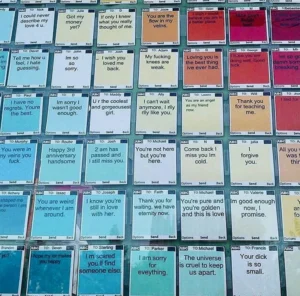Introduction to the Unsent Project
The Unsent Project is a creative initiative that encourages individuals to articulate their innermost feelings and thoughts through the medium of unsent letters. Originating from the need for emotional expression, this project provides a unique outlet for people to confront their uncommunicated sentiments. In an increasingly digital world, where communication often prioritizes brevity and clarity, the Unsent Project offers a space to explore the nuances of emotion without the pressure of delivery.
At its core, the Unsent Project recognizes that many individuals harbor thoughts they may find too vulnerable to share. This initiative invites participants to write letters that capture unexpressed feelings, whether they be regrets, confessions, or reflections about relationships, dreams, and past experiences. The letters, while personal, are often shared in a communal space, allowing others to witness and relate to these unsaid sentiments. This sense of shared vulnerability fosters a supportive atmosphere, highlighting that the human experience is universally interwoven with unspoken emotions.
Psychologically, engaging in the Unsent Project can serve as a cathartic experience. Writing letters that are never sent can help individuals process their thoughts, enabling them to gain clarity and closure on unresolved matters. Moreover, this practice encourages introspection, leading participants to explore aspects of their lives they may have previously overlooked. By releasing these emotions onto paper instead of bottling them up, individuals can achieve a sense of relief and self-discovery.
The Unsent Project stands as a testament to the power of the written word in emotional healing and self-exploration. It allows countless individuals to break free from the confines of silence, transforming their unexpressed thoughts into meaningful reflections. Through this initiative, the act of writing becomes not just a creative outlet, but a vital step toward emotional well-being.
The Emotional Impact of Unsent Letters
Unsent letters have long served as a conduit for expressing deep emotions that often remain unspoken in our daily lives. The act of writing these letters can provide a significant emotional release, allowing individuals to articulate their thoughts and feelings in a manner that fosters reflection and understanding. This process often leads to catharsis, as the writer confronts their emotions without the pressure of delivering them to a recipient. The therapeutic benefits of engaging with our internal narratives are particularly profound for those dealing with unresolved feelings, grief, or trauma.
Participants of the Unsent Project frequently report feelings of relief after penning down their thoughts. For instance, one individual shared how writing an unsent letter to a deceased loved one allowed them to express unvoiced sentiments of love and regret. This exercise not only enabled them to commemorate their relationship but also provided a framework through which they could process their grief. Such engagement emphasizes how the simple act of writing can serve as a powerful tool for emotional healing.
Furthermore, unsent letters can facilitate closure by providing individuals an opportunity to articulate feelings that they might otherwise bottle up. In the absence of conversation, these written expressions can validate emotions, allowing one to feel heard, even if just by themselves. Several participants have noted that they embarked on this journey initially as a means to express negative feelings, such as anger or resentment. However, they often discovered a more complex web of emotions that led to personal insight and growth.
Ultimately, the emotional impact of writing unsent letters transcends the act itself. By transforming turmoil into words, participants embark on a path towards understanding, healing, and reconciling with their inner selves. This transformative journey, emphasized through real-life accounts within the Unsent Project, highlights the profound psychological benefits of confronting and articulating one’s emotions.

How to Participate in the Unsent Project
Participating in the Unsent Project is a rewarding creative endeavor that allows individuals to express their unwritten thoughts through unsent letters. To get started, the first step involves choosing your medium — decide whether you want to handwrite your letter or compose it digitally. Each method has its unique charm; handwriting can evoke intimacy, while a digital format offers ease and accessibility.
Next, consider the content of your unsent letter. Focus on a specific theme or person that inspires your writing. Popular themes often include unrequited love, unresolved conflicts, or reflections on personal growth. By reflecting on your emotions and experiences, you can pour your thoughts genuinely onto the page. It may also help to use prompts, such as “What would I say to my younger self?” or “A letter to someone I’ve lost.” These can act as catalysts, guiding your expression and helping you articulate complex feelings.
When composing your letter, keep in mind that it is an intimate and personal process. There is no pressure to adhere to grammar rules or formalities; instead, focus on genuine expression. To enhance readability, write in paragraphs, and employ simple yet impactful language to convey your emotions effectively. This ensures that the unsent letter resonates not only with you but also with those who may eventually read it.
Once your letter is complete, you may choose to submit it to platforms associated with the Unsent Project. These platforms often encourage community engagement and can offer feedback or support, creating a connected space for participants. Engaging with others who share similar experiences can amplify the impact of your writing, enriching your creative journey. Embrace this opportunity to explore your thoughts without the constraints of sending them, allowing your voice to flourish in the process.
The Broader Cultural Significance of the Unsent Project
The Unsent Project serves as a profound exploration of the significance of written communication in a rapidly evolving digital landscape. In contemporary society, where social media dominates personal and public dialogues, the written word retains an essential role as a means of expressing thoughts and emotions that might otherwise remain unspoken. This project invites individuals to articulate feelings connected to unsent letters, providing a unique opportunity for introspection and catharsis.
In an era marked by fleeting digital interactions, the Unsent Project underscores the importance of mental health awareness. The act of writing unsent letters can serve as a therapeutic exercise, allowing individuals to process complex emotions, confront unresolved issues, and gain clarity on their experiences. The letters not only represent personal narratives but also foster a greater understanding of shared human struggles. By encouraging participants to explore their emotions deeply, the project contributes to a broader conversation about mental well-being and the necessity of taking time for self-reflection.
Furthermore, the Unsent Project cultivates a sense of community among individuals who share similar experiences and sentiments. By providing a platform for people to connect through their written expressions, the project embodies the themes of authenticity and vulnerability. In a world where curated identities often overshadow genuine self-representation, the Unsent Project celebrates personal narratives in their raw and unrefined forms. This collective sharing fosters empathy and understanding, as participants recognize their own feelings mirrored in the experiences of others.
In essence, the Unsent Project not only highlights the cultural relevance of written communication but also promotes mental health awareness while encouraging community building through shared vulnerability. This exploration of unsent thoughts allows a deeper understanding of how individuals navigate their emotions and relationships in a complex world.
